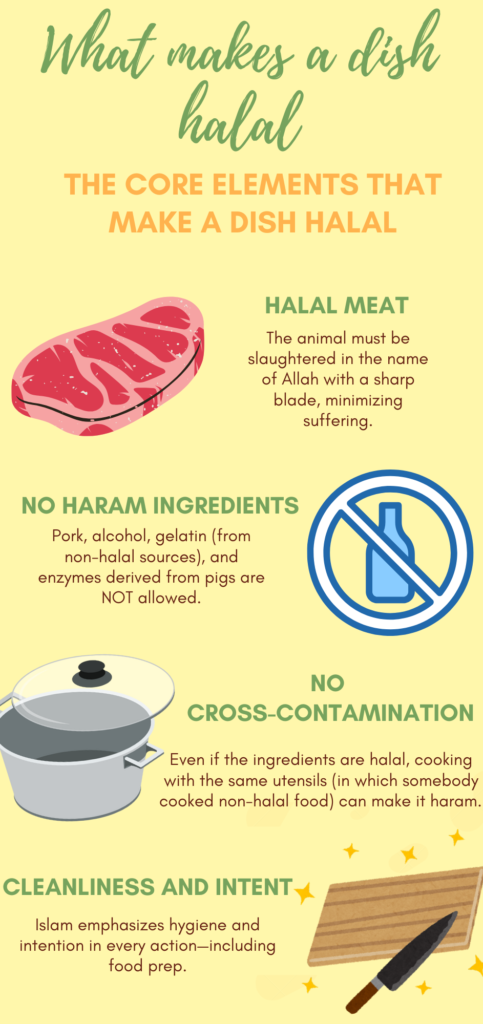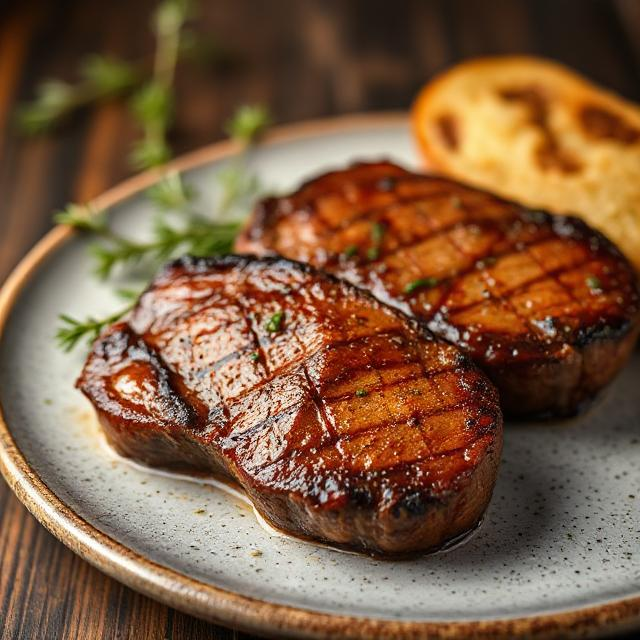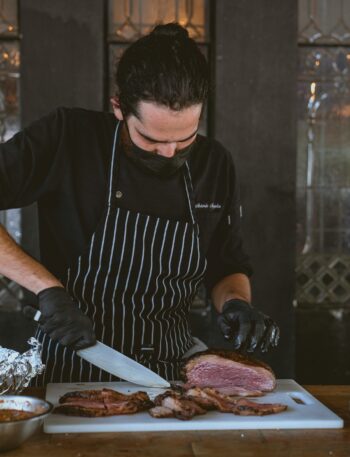You’ve probably seen the word “halal” on restaurant menus or food packaging. But have you ever wondered what makes a dish halal? In today’s global food culture, understanding halal food has become really important. Whether you’re a lifelong Muslim or simply curious about halal-friendly food, this guide breaks down everything you need to know about halal certification and what makes your food spiritually and practically halal.
What does “Halal” mean in food?
When it comes to food, halal refers to items that meet Islamic dietary guidelines. This includes what you eat, how it’s sourced, how it’s prepared, and even how it’s served. In contrast, haram means forbidden (like pork, alcohol, or improperly slaughtered meat).
That’s why it matters not just what’s on your plate, but how it got there.
What makes a dish halal: The elements to consider

Not every seemingly halal dish actually checks all the boxes. Here’s what makes food truly halal:
- Halal meat: For meat to be halal, the animal must be respectfully slaughtered by invoking Allah’s name and using a swift, sharp blade to ensure minimal pain.
- No haram ingredients: Pork, alcohol, gelatin (from non-halal sources), and enzymes derived from pigs are off-limits.
- No cross-contamination: Even if the ingredients are halal, cooking with the same utensils (in which somebody cooked non-halal food) can make it haram. You don’t need to get confused! Here are my practical halal cooking suggestions to deepen your understanding of what it truly means to prepare food the halal way.
- Cleanliness and intent: Islam emphasizes hygiene and intention in every action—including food prep.
What is halal certification?
Halal certification is a verification process for ensuring that products comply with Islamic standards. Certified organizations – including IFANCA (USA), HFA (UK) , or SANHA (South Africa) evaluate everything from sourcing to production to ensure compliance with Islamic law.
Why it matters:
- Helps Muslim consumers shop confidently.
- Ensures restaurant food is properly prepared.
- Builds trust in multicultural communities.
Look for halal certification symbols on packaging and in restaurant windows. They’re your green light!
Common misconceptions about halal food
Let’s clear up a few myths:
Misconception # 1: “Halal just means no pork.”
Fact: Not true. There’s more to it. Cross-contamination, alcohol, and non-zabiha meat also make a dish haram.
Misconception # 2: “All vegetarian food is halal.”
Fact: Not always. Many cheeses, candies, and sauces use alcohol-based extracts or animal-derived enzymes.
Misconception # 3: “Halal certification doesn’t really matter—it’s just a formality.”
Fact: It’s a serious process involving inspections, audits, and ongoing monitoring to maintain integrity.
How to tell if a dish or a food ingredient is truly halal
Here’s your checklist:
- Look for the halal logo from a trusted certifier.
- Read the ingredients list and watch out for gelatin, rennet, or flavorings.
- Ask questions at restaurants: Is the meat zabiha? Are separate utensils used?
- Know your brands when selecting halal ingredients for cooking at home. Some ingredients are fully halal-certified while others require extra scrutiny.
Why Halal Certification matters to Muslims
For those who follow Islam, choosing halal food goes beyond personal preference – it’s a fundamental part of practicing their faith. Plus, halal certification offers peace of mind in a world where ingredient labels can be confusing.
Final Thoughts
Understanding what makes a dish or food ingredients truly halal empowers us to make better food choices (not just for our health, but for our faith and values). Halal certification ensures transparency, trust, and consistency, especially when dining out or buying packaged foods and ingredients. As people prefer halal ingredients more, it’s important that they are also aware of what makes a dish halal.
So, have you ever questioned whether a food ingredient is really halal? Or had a surprising experience checking labels? Share your thoughts in the comments—I’d love to hear your story and help others stay informed!
For more halal recipes, tips, and inspiration, stay tuned to PureHalalBites.com. Let’s make halal cooking a joyful and fulfilling journey together!



